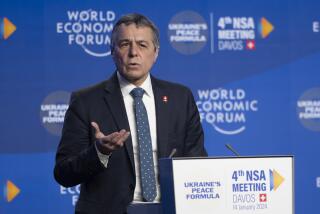NEWS ANALYSIS : East-West Issues Overlap, Stall Talks : Diplomacy: The Soviets want arms control linked to German unification. As a result, deadlocks loom on both matters.
- Share via
BONN — Negotiators had expected to reach agreement this year on German unification and conventional arms control, but the two issues have become so intertwined that an East-West deadlock seems likely.
According to diplomatic analysts in West European capitals, Soviet negotiators have slowed the momentum of the conventional arms control talks in Vienna and the strategic missile talks in Geneva, as well.
Further, they say, new Soviet proposals in the so-called two-plus-four talks on German unification could hold up the pace of that process. Taking part in the talks aimed at working out a formula for the security issues involved in unification are West Germany and East Germany, and the four Allied powers that won World War II: the United States, the Soviet Union, Britain and France.
The slowdown could jeopardize the scheduled fall meeting of the Conference on Security and Cooperation in Europe, which is to bring together the leaders of 35 nations--all the European nations except Albania, plus the United States and Canada.
The major hang-up, close observers of the situation say, is Moscow’s insistence that a unified Germany be neutral, coupled with a call for reducing German troop strength.
Until a few weeks ago, the talks seemed to be moving ahead on all fronts: The strategic arms talks, aiming for a 50% reduction in strategic ballistic missiles, appeared to be ready for signing at next month’s summit meeting of Presidents Bush and Mikhail S. Gorbachev in Washington; the conventional arms talks seemed to be on the verge of a breakthrough concerning troop levels and weapons in Central Europe; a blueprint for German unification was said to be only weeks away.
But then, according to diplomatic sources, the Soviets started having second thoughts.
For reasons still not altogether clear, the treaty on strategic weapons apparently will not be ready by the time Bush and Gorbachev meet next month.
Moreover, the Soviet negotiators have begun arguing that German troop strength should be a matter for consideration in the reunification talks, and probably for the talks on conventional weapons as well.
Washington insists that both sides have already agreed that the conventional arms talks will deal only with weapons, equipment and foreign forces based in Central Europe. This, the Americans argue, eliminates for now any discussion of German troop strength.
The West German government agrees that the size of the German army--now about 490,000 men--should not be fixed in the agreement on unification. It says this is a question to be taken up in future talks on conventional weapons, talks aimed at limiting the size not only of German but of other national armies in Central Europe.
U.S. negotiators in Vienna want the agreement on conventional arms to be concluded quickly, with no repeated shifts in ceilings, as new proposals are put forth.
As one put it, “We want to get a . . . framework in place first, and we can change the numbers around later. If you keep switching figures now, you won’t get a framework agreement.”
The West Germans say the unification agenda should cover such matters as whether the new Germany will be a member of the North Atlantic Treaty Organization, the status of forces in what is now East Germany, the Berlin question and the question of Germany’s borders with Poland.
Officials in the West German Foreign Ministry believe that a unification agreement can be ready by the end of the summer. Also by then, they think, the conventional arms talks should be concluded. Then the conference of European, U.S. and Canadian leaders could approve the arms agreement as well as a scheme for German unification.
But sources in Vienna--where negotiations are reported to have slowed--say that without an arms agreement there is no point in going ahead with the summit conference.
Diplomats wonder if the present round of talks on conventional arms can be concluded successfully if the Soviets insist on linking the troop levels and German reunification. A central problem, they say, is that the Soviet leadership has been distracted by problems at home: the Baltic republics, minority peoples, the economy.
Moreover, although Soviet army generals are not happy to leave their troops in Germany, surrounded by an antagonistic populace, they have no place at present to garrison them at home.
The United States, Britain and France generally support the West German position on the troop issue insofar as it involves the unification talks.
But the Soviets could hold up progress on all three fronts if they cling to the position that the strength of the West German army must be reduced sharply--and that this should be done in the present round of conventional arms talks.
More to Read
Sign up for Essential California
The most important California stories and recommendations in your inbox every morning.
You may occasionally receive promotional content from the Los Angeles Times.













